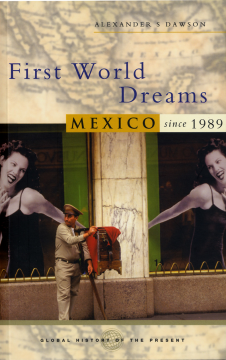
Additional Information
Book Details
Abstract
Mexicans have long dreamt of the First World, and in recent times it has landed with a thud. Under the guise of globalization, Mexico opened its borders, reformed its political system, and transformed its economy. The impacts have been paradoxical.
In First World Dreams Alexander Dawson explores the contradictions and challenges which Mexico has experienced in embracing the market so wholeheartedly. A vibrant civil society is marred by human rights abuses and violent rebellion. Market reforms have produced a stable economy, economic growth and great fortunes, while devastating much of the countryside and crippling domestic producers. Mexico is today one of the world's largest exporting nations, yet has a perpetually negative trade balance. It is in a constant state of becoming a democracy, a nation where human rights are respected, a modern industrial nation, and a more violent, fragmented place where the chasms of wealth and poverty threaten to undo the dreams of modernity.
Alexander Dawson is Associate Professor of Latin American history at Simon Fraser University, in British Columbia, Canada. His research has focused on Indian-State relations in Mexico, and on the impact of globalization in Mexico. His publications include Indian and Nation in Revolutionary Mexico (2004).
'Finally, a book that examines the new Mexico that emerged from the 1982 devaluation and the 1985 earthquake. Alexander Dawson weaves the interplay of globalization, neo-liberalism, national politics, and the everyday life of the Mexican people into a complex, insightful narrative.'
William H. Beezley, University of Arizona
'This insightful study successfully explains mexico's change from a one-party political system safeguarded by its control over the economy, to a society characterized by mulitiple political parties and a free market financial structure.'
J. R. Anguila
Table of Contents
| Section Title | Page | Action | Price |
|---|---|---|---|
| Cover\r | Cover | ||
| Contents | v | ||
| Acknowledgments | vi | ||
| 1 | Why 1989? | 1 | ||
| Before the global age | 3 | ||
| The crisis | 6 | ||
| September 19, 1985 | 11 | ||
| Openings | 13 | ||
| Political challenges | 18 | ||
| 2 | Salinastroika | 23 | ||
| Revenge of the technocrats | 24 | ||
| Openings | 28 | ||
| A difficult transition to modernity | 30 | ||
| Privatizing the social contract | 32 | ||
| Agricultural reform | 34 | ||
| Political openings | 37 | ||
| Winners, losers, and also-rans | 41 | ||
| 3 | Nineteen ninety-four | 46 | ||
| The first rebellion of the cyber-age | 47 | ||
| Behind the masks | 51 | ||
| On indigenous self-determination | 56 | ||
| Things fall apart | 60 | ||
| The peso crisis | 65 | ||
| 4 | The last days of the PRI? | 70 | ||
| The other kind of global trade | 76 | ||
| The most dangerous city in the world | 80 | ||
| Zedillo versus the PRI | 83 | ||
| Elections | 88 | ||
| 5 | Border crossings in an age of terror | 96 | ||
| Lives of the migrants | 101 | ||
| Dollars and cents | 103 | ||
| Fox’s moment | 105 | ||
| What terrifies Mexicans | 111 | ||
| 6 | A decade of NAFTA | 118 | ||
| The new Mexican economy | 119 | ||
| Two (or more) Mexicos | 120 | ||
| Poverty | 126 | ||
| The beleaguered middle class | 129 | ||
| The logic of the market | 132 | ||
| Troubling signs | 134 | ||
| Conclusion | 139 | ||
| 7 | Conclusion: democracy in Mexico | 141 | ||
| Processes | 142 | ||
| The specter of human rights | 147 | ||
| Indigenous self-determination | 156 | ||
| The poverty of democracy | 164 | ||
| Epilogue: 2006 | 168 | ||
| Notes | 171 | ||
| Further reading | 179 | ||
| Index | 184 |
